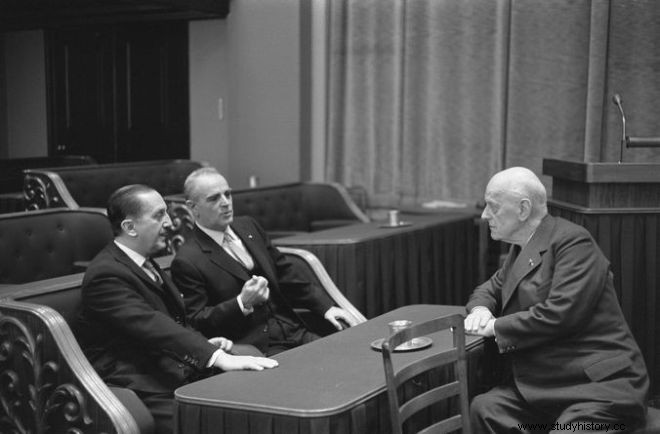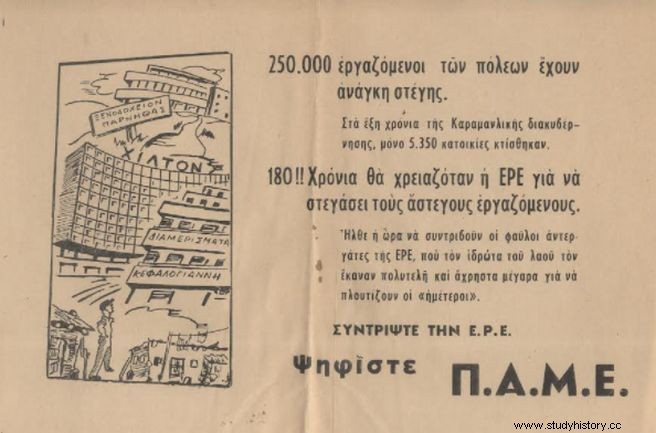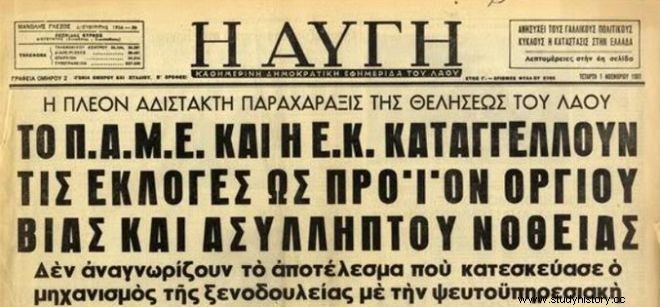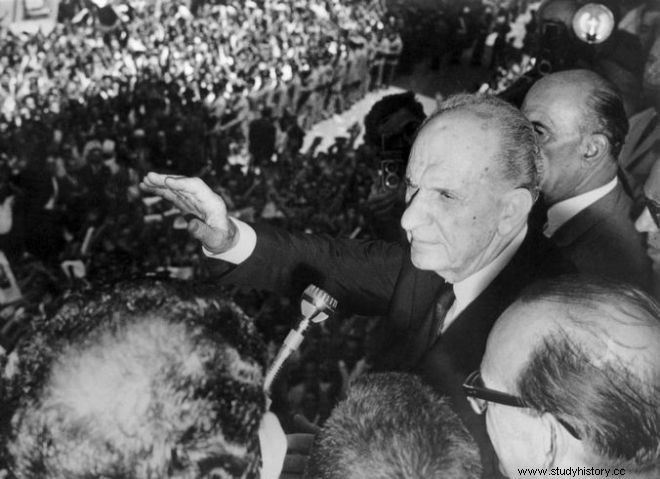In collective memory, the election of October 29, 1961 was recorded as the election of violence and fraud or, according to others, the election in which the trees also voted. In fact, everything that happened before, during and after the specific elections, constituted the beginning of an "abnormality" in the functioning of the state that finally led to the complete diversion, that is, the coup of the Colonels on April 21, 1967.
In 20th century Greece anyway, historical time was never denser than the period of the first seven years of the 60s after the political crisis peaked, the popular factor rushed to the fore and the reaction, domestic and foreign, played her change so that Greece would "stay away from the miasma of communism" at the time when the Cold War was at its height.
The political climate:Anger for the Karamanlis government
But what exactly happened in the elections of 1961 and why are they an intersection in historical time? Let us first examine how the political climate was shaped after the 1958 elections, which replaced the EDA as the Official Opposition, and also after the Zurich and London agreements (1959) to resolve the Cyprus problem.
The electoral explosion of EDA, which with 24% shocked everyone, inside and outside Greece, caused alarm in all poles of power. First of all, the Americans were particularly alarmed, seeing that in their satellite country in the Eastern Mediterranean, a political faction that did not agree with their plans for the wider region was gaining significant ground. However, both the Palace and the Army, in which processes and internal movements by "concerned" officers, high-ranking and non-ranking, had been taking place for a long time, made noise.
With the Zurich and London agreements on the Cyprus Problem which promoted an independent state solution with a Greek Cypriot president and a Turkish Cypriot vice president, Prime Minister Konstantinos Karamanlis saw his popularity decline. The agreements, by which any plans for the Union of Cyprus with Greece were definitively abandoned, were interpreted by public opinion as a national retreat, a fact that the Greek Prime Minister himself understood.
As we read in the book by Alexis Papachelas, "The rape of the Hellenic Republic" (Estia publications), "Karamanlis did not hide his discomfort with the concessions he was forced to make in the Cyprus issue" when he was talking to American officials. In fact, in his contact with the envoy of American President Eisenhower, George Magee, he said that "he could have gone down in the history of Greece as a great man who supported the desire of all Greeks for the Union and now they call him a traitor".

Under these political circumstances, Karamanlis had a difficult time in the Parliament in 1959 and 1960 with the criticism of the opposition (Left and Center) being particularly harsh towards him. Nevertheless, the leader of the ERE always enjoyed the confidence of the American agent. The then American ambassador in Athens, Ellis Briggs, had developed close relations with the Serrai politician and they often exchanged private views. As Alexis Papachelas writes, Briggs informed Washington after a meal with Karamanlis that "we left with the impression that we have a tough, self-sufficient, confident politician and leader who is honest with us and deserves our support."
When the new electoral law was passed in June 1961 (enhanced proportionality), Karamanlis did not think twice. In September of the same year he resigned and an election was called for 29 October 1961. The Palace took over the appointment of a caretaker government, a process that proved key to what happened before and during the election. At the same time the parastatal groups in the army were taking up battle positions.
The Palace intrigue
The person initially chosen to lead the caretaker government (which would be in power for about 40 days) was the retired general Thrasyvoulos Tsakalotos, known for his action mainly during the years of the Civil War. However, the Palace, as the historian Tasos Vournas writes in his book "History of Modern Greece", Volume V (Pataki publications), wanted a person of his absolute confidence in the service cabinet and specifically in the position of Minister of Defense. This was the retired Wing Commander Charalambos Potamianos who undertook to convey the palace's wishes to the candidate acting Prime Minister himself.
The dialogue between Tsakalotos and Potamianos, as conveyed by Solon Grigoriadis and recorded in Tasos Vournas's book, is indicative of the way in which the palace wished to influence things.
Tsakalotos :With me Prime Minister, you do not become Minister of Defense.
Potamianos: But since it is the King's wish?
Jackal: Let it be.
To his credit, General Tsakalotos did not give in to the pressure. However, the Palace persisted and finally managed to pass its own view, even if it almost blew up the government's swearing-in. As Tasos Vournas reports, shortly before the swearing-in process, General Balodimos, director of the Political Office of the Palaces, visited Tsakalotos at his home. There the following dialogue took place:
Balodemos: I come on behalf of the king, who asks you to accept Potamiano as Minister of Defence.
Jackal: This is not possible.
Balodemos: Then, we will go to Dovan.
Thus, completely suddenly, and with the wishes of the Palaces, the former top officer of the Army, Konstantinos Dovas, took over as acting Prime Minister, with, of course, Charalambos Potamianos as Minister of Defense. The anomaly had just begun...
The Pericles Plan:A Secret Coup in the Age of Democracy
But, since August 1961, when Konstantinos Karamanlis was still Prime Minister, the first chapters of the drama had already been written. And this because much later, in 1964, when the Center Union of George Papandreou was already in charge of the country, it was revealed that an "invisible committee" approved by the then Prime Minister, had undertaken the dirty work, that is, "finding methods of persecution of Communism".
The...method was none other than the infamous Pericles plan which was signed by the then head of GES Vassilis Kardamakis. This very plan was put into operation by the committee which was made up of the heads of the Armed Forces and the Police as well as a deeply anti-communist lieutenant colonel of the KYP whose name was George Papadopoulos. The subsequent dictator...

The plan had two clear goals. That the ERE prevail and that Konstantinos Karamanlis form an independent government and that the percentage of the EDA be reduced, if possible below 20%. Both objectives were achieved to the great satisfaction of the Palace, the Army and of course the Americans who were watching the situation closely. Either way, the elections resulted in both a National Government and a National Opposition, since the newly formed Center Union of George Papandreou came in second place. However, in order to achieve the desired result for reactive circles, a lot had to be done.
The violence...
Tasos Vournas presents the events with a clear description:"The state's attack was terrible in order to terrorize the Greek people and distort the election results. Attacks, injuries, violations of the constitutional freedoms of citizens were announced from everywhere. Terror prevailed throughout Greece. The Left, allied to a limited extent in the PA-ME electoral formation, took the brunt of the attacks even in the capital itself. Thus, the ERE came out the first party from the ballot box with 50.77% and 176 seats. The Union Center 33.69% and 100 seats while EDA collapsed to the "normal" limits of the "extreme" Left with 14.65% and 24 seats".
One would say that the balance of the system had been restored. The EPE, although hurt by the developments in the Cyprus issue (and not only), managed to improve its percentage by 9% compared to the 1958 elections. The EDA lost exactly the same percentage of votes, towards which the attacks of the parastatal mechanisms.
...and forgery
However, even under the regime of violence, it would be very difficult for the ERE to increase its percentages so spectacularly (don't forget that Konstantinos Karamanlis served a third term as Prime Minister). The election result had to be falsified in ways...typically Greek and parastatal. The revelations that came to light in the following months from the opposition press and what the Center Union and EDA recorded in the Black Books they issued are now causing laughter, but at the time they certainly aroused the anger of the democratic citizens.
The security forces became the protagonists of fraud after police officers voted more than once! On December 31, 1961, in a front page issue, Vima writes that "206 voted as tenants of Rigillis house 18 and 303 police officers voted in two parishes of Ampelokipos and Zografou". Soldiers, on the other hand, voted twice since they had election booklets while their names were also on the registers.
In houses, which proved to be dilapidated (in New Philadelphia and elsewhere), not a few voters were declared. Many of them were policemen, as happened with a house in Haidari, at 10 Koumoundourou Street, in which 13 (!) policemen were declared as workers. Even in plots of land they declared themselves voters. The photographic lens of the time revealed that at 38 Sardeon Street in New Philadelphia, where the voter had declared his permanent residence, there was nothing but a plot of land with two...trees.
Later, during 1963, as the journalist Viktoras Netas writes in the "Historical" magazine of the "Eleftherotypia" newspaper, the retired lieutenant general G. Petropoulos stated, during a trial, the following:"I was the right hand of (the head of the GES ) Kardamakis and I am in a position to know the national crime committed in the elections" and "how 90% of the military units came out in favor of ERE". It was, of course, far-fetched to believe that 9 out of 10 Greek soldiers voted for the right because they wanted to...

The Center Union, for its part, as the Official Opposition, raised the issue very high. Even before the elections, he had warned that he would not tolerate fraud that would alter the will of the citizens, while subsequently, in January 1962, and after the investigation had confirmed what had been done offensive to the government in the October elections, George Papandreou declared the Unyielding Struggle not recognizing as legitimate the government formed by the ERE.
The Old Man of the Republic was vindicated with his electoral victory in 1964 but his rule proved short-lived as the Palace, now under King Constantine, decided in the summer of 1965 to complete the anomaly that had begun in 1961. The royal "coup" led to apostasy , in the deregulation of political life and finally in the military coup on April 21, 1967.

The "apology" Karamanlis
It is questionable to this day whether Konstantinos Karamanlis knew the extent of the violence and fraud of the 1961 elections. It is also questionable whether he knew the exact action of the parastatal machine which he had already approved since August 1961.
In the memos found in the Karamanli Archives, the National Archdiocese denies everything, but admits that the involvement of acting Defense Minister Charalambos Potamianos was suspicious. "And I call her suspicious because, as it turned out in hindsight, his placement in the Ministry of National Defense was related to the stupid plans to suppress, during the upcoming elections, the power of the communists. These stupid plans were carried out by secret services without her knowledge of my government. Mr. Potamianos informed the leaders of the opposition about these plans and advised them to try to benefit themselves".
This is what Konstantinos Karamanlis writes in the 5th volume of his archives, as Victoros Netas reported them in the "History" of "Eleftherotypia". It is probably too much to believe that Potamianos was placed by the Palace in the Interim Government to work for the EDA and the Center Union even if he disliked Karamanlis.
Below the then Prime Minister goes a step further:"I do not know whether, without my knowledge, either the government at the behest of the king, or the army, took measures to curb communism. I do not rule it out completely, given that after the elections of 1958, the swelling of the forces of the EDA caused national concern. However, even if such an attempt was made, which, firstly, happened without my knowledge, secondly, it was not done at the expense of the Center Union but at the expense of the EDA and for the benefit of the former, and thirdly, it was practically it was impossible to influence the outcome of the election, given that within the department the secrecy and freedom of the vote was guaranteed as it appears from the minutes of the ephorates of all the departments of the country".
This approach of Karamanlis is very reminiscent of the famous phrase "who rules this place" attributed to him in connection with the assassination of Grigoris Lambrakis in 1963. Did the Prime Minister of the country ultimately know about the actions of the parastatal apparatus from 1961 onwards; There is no definite answer. However, he has the historical responsibility, whether he knew it or not...
The winners are...Americans
In any case, however, the action of the parastatals served the plans of the Americans. As Alexis Papachelas writes in the book "The Rape of the Greek Republic", the CIA had a clear picture of what was going on since its information "tended to confirm that the military administration had made every effort to secure many votes for Karamanlis, and that General Kardamakis, the leader of the GES and associate of the Prime Minister for many years, had been involved in the pre-election campaign".
And the American ambassador in Athens, Ellis Briggs, could not hide his satisfaction with the result of the elections of October 29, 1961, and in his related telegram to the US Secretary of State, he said (according to what Alexis Papachelas mentions):"The unique good news from the NATO camp for 1961 was the results of the Greek election which was such a slap in the face to the communists, it made their teeth chatter".
The slap, then, that made the teeth of the Greek communists chatter, was the main American goal. In this sense those who triumphed in the electoral arena were the Americans and their interests in the Eastern Mediterranean. Not so democratic, of course, but these were fine print in the world of the Cold War...
Sources:
Alexis Papachelas, The Rape of Greek Democracy, Estia Publications
Tasos Vournas, History of modern and modern Greece, Volume V, Pataki Publications
Historically, "Eleftherotypias" magazine (February 26, 2004 page)
Follow News247.gr on Google News and be the first to know all the news
